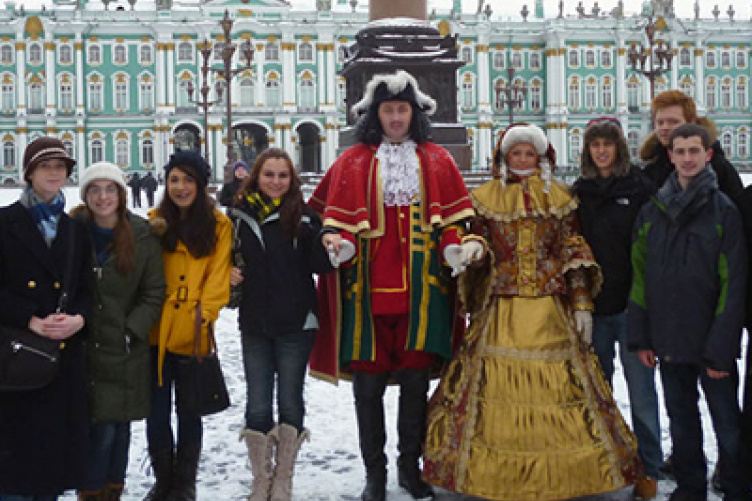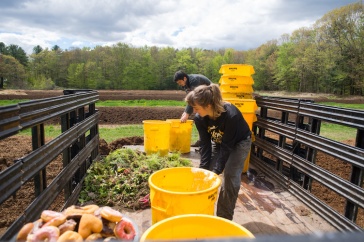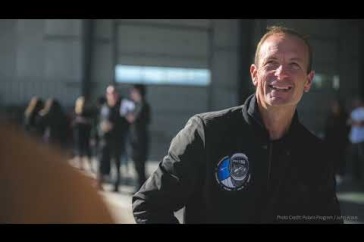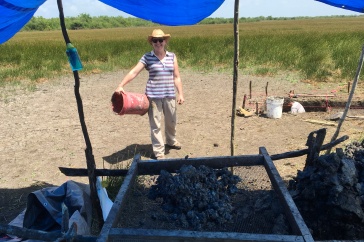
“The real voyage of discovery consists not in seeking new landscapes, but in having new eyes.”
This January Term, three study abroad programs will provide the focus for students to experience new cultures to the fullest – be it in Costa Rica, Rome, or Moscow.
Studying abroad is often considered the highlight of a four-year education, but for students on a tight budget or with super-packed academic schedules it can seem out of reach. Now, with four study abroad options being offered by the College of Liberal Arts during January Term, many students will soon be posing for their passport photos.
Where will they fly? Could be Costa Rica, Rome, or Moscow. Each course, led by experienced UNH faculty, will have its own special, intense educational focus.
To help students with trip logistics, the College now has a full-time study abroad adviser, Lisa Mulvey.
January Term registration begins October 22, however, many programs have earlier application deadlines.
|
|
The Politics of Costa Rica, 4 credits, three weeks, POLT 543, WC (world cultures), Associate Professor Mary Malone
Why is Costa Rica exceptional? Political science professor Mary Malone engages students in an in-depth exploration of that question.
To prep for their journey, students take a two-day online course to learn about the history of Costa Rica.
“The first week we’re there, we head out to see some of the key parts of the country’s political development,” says Malone. For example, in 1949, the civil war in Costa Rica was fought over elections. When the new democratic government was formed they established a separate independent branch of government just for elections.
“We visit those offices and meet everyone at every stage of the electoral process from those who design the voter IDs, to people who set up the ballots in each district, to those who count them.”
Students get to see the legislature in action and learn some of its rules. “For example, if legislators aren’t there for a session, they get their pay docked,” says Malone.
While touring coffee plantations, students learn about the role that commodity plays in the economy and society. To focus on the country’s sustainable development, they spend time at Earth University and also stay with rural families. Visits to health care clinics give them a firsthand look at what investment in human capital looks like. As Malone notes, Costa Rica’s human development indicators (e.g., health and educational levels) are on par with wealthy countries.
“We also spend the weekend at an environmental beach resort, Punta Leone,” says Malone with a smile. “It’s a lot of fun.”
For Zachary Shobin, a political science major from Sudbury, Mass., the highlight of the trip last year was his stay with a host family. “I was concerned that I wouldn’t be able to communicate with them. I’ve only taken the most basic Spanish course,” writes Shobin. “At first everyone seemed to be talking so fast, but as the days went by it slowed down. My host family was extremely friendly and welcoming. It was a life-changing experience.”
|
|
Building Rome, 4 credits, two weeks, CLAS 510, FPA (fine and performing arts), Professors R. Scott Smith and Stephen Brunet
In the ancient world, if you won the war, recounts Professor R. Smith, you got to parade your troops through Rome, the center of the Roman Empire. You’d trot along past the monuments of previous generals constructed from volcanic rock or terracotta, and then, after the triumph, you’d build your own monument, perhaps out of an exotic marble.
“In the second century A.D., Rome had at least 1.5 million people living there,” says Smith, who teaches classics. Eleven major aqueducts came into the city, which had fountains, a sewer system, and public baths. There were giant apartment complexes, which were prone to fire and plague.
“Rome is not so much about urban planning as it is about urban sprawl. But we’ll study other better preserved cities such as Ostia and Pompeii.”
Smith, who can translate Latin so precisely that the idioms are keyed to the decade, knows the classical world inside and out, and he is a wonderful storyteller.
The course begins with five days of online study, so students will be ready to “soak in the monuments of the past.” It continues abroad for ten days in Italy – six in Rome, and two more in Pompeii and Paestum.
For Nikki Bell ’14, a classics major from Exeter, N.H., the trip promises to bring her major to life. “Being on the ground of the place I’ve been learning so much about will make it possible to get a mental picture of what life was like for the ancients. To see Latin everywhere will really reinforce for me the importance of the language, even in today’s world.”
As Smith explains, “We’ll teach students how the ancient city is preserved in the modern context and ask them to create a narrative of what they are seeing and how to interpret it.”
|
|
Mythology and Propaganda in Moscow, 4 credits, three weeks, RUSS 525M, HP (historical perspectives), Associate Professor Aleksa Fleszar and instructor Ekaterina Burvikova
Russia is the largest country on Earth. It is where East meets West, and its history spans a thousand years. How can a small band of UNH students begin to embrace this culture in such a short time?
Associate Professor Aleksa Fleszar, who teaches Russian, just chuckles. “Winter is magical there,” she says simply, “When you walk out into Red Square and see the snow glisten and the onion domes of the cathedral – it’s like a fairy tale.”
“But,” she continues, “to understand Russia and to learn its language is very practical in terms of jobs. For instance, Russian is a priority language for many U.S. governmental departments – defense, agriculture, energy, housing and urban development, and so on.”
However, no previous knowledge of Russian is required for this trip. Fleszar has designed the course so that all of its excursions are part of the academic program. Throughout the trip, she remains in close contact with her on site co-teacher, Ekaterina Burvikova, who is from Moscow and has led previous UNH trips. They have it down.
The first four days are in Saint Petersburg, considered the “cradle of the Russian Revolution” that brought Communism to the nation. Students visit the Hermitage, one of the world’s largest museums with an impressive collection of modern art. Students also attend either the theatre or the ballet. And then, they leave for Moscow on an overnight train.
In Moscow, they stay with host families, learn the metro, and soon are deeply immersed in visiting key historical and cultural sites such as the Kremlin, the Tretyakov Gallery, and KGB Headquarters. Students get a chance to travel around Moscow to see the Tsar’s summer palace and the home of Vladimir Lenin, Russian communism’s first great leader.
A highlight last year for one student was the visit to the Lenin’s home: “… we learned about him as a person. He had an impressive library where he would read international news and journals in the original language. He was fluent in nine languages.”
But for another student, it was the train trip: “The vision at 12:30 a.m., full moon, dark sky over a darker forest, standing in between two cars, Russian guys… smoking cigarettes … That is the real experience.”
Complete list of January Term opportunties abroad.
Originally published by:
The College Letter, Newsletter for the College of Liberal Arts



















































